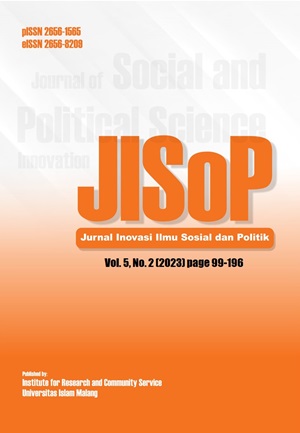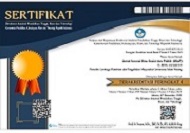Blater's power in local politics, village head election in Madura
DOI:
https://doi.org/10.33474/jisop.v5i2.20562Keywords:
blater, madurese politics, village head election, local politicsAbstract
The involvement of elite groups or certain groups in winning political contests is often carried out by candidates for political office. This also happens in local political contestations, village head elections. This research was conducted to reveal the role and behavior of blater in village elections in Sumenep, Madura, East Java. This research uses a descriptive qualitative model. The data collection technique was carried out using in-depth interviews with various informants involved in the election, such as blater, village head candidates and voters. Apart from that, document searches were also carried out regarding village election activities and after the election of the village head. To obtain accurate data, the research cross-checked the data collected, between the data obtained through in-depth interviews, and the documents traced and obtained by the researcher. From the research conducted, blater has an important role in the election of village heads. This is caused by several factors. Blater has influence, blater also has a strategy for carrying out his role, blater has certain preferences when the village head election takes place, and blater's role has an impact on the village head election process. Apart from that, the blater has a network that shapes the winning process.
References
Afif, M. (2018). Legal findings by the judge in the carok cases consequential land disputes in madura society. Soumatera Law Review, 1(2), 300–301. https://doi.org/10.22216/soumlaw.v1i2.3714
Agger, R. E. (1957). The Power Elite. By C. Wright Mills. New York: Oxford University Press, 1956. 423 pp. $6.00. Social Forces, 35(3), 287–288. https://doi.org/10.2307/2573526
Asmawati, Muadi, S., & Tawakkal, G. T. I. (2020). Hidup dalam Stigma: Kekerasan dan Religiuitas Bejingan. Al-Mada Jurnal Agama Sosial Dan Budaya, 3(2), 109–202. https://doi.org/10.31538/almada.v3i2.694
Asmawati, Tawakkal, T. I., & Muadi, S. (2021). Religion, Political Contestation and Democracy: Kiai’s Role as Vote Broker in Madurese Local Political Battle. Buletin Al-Turas, 27(1), 37–54. https://doi.org/10.15408/bat.v27i1.15650
Baihaki, A. (2023). Symbolic communication in determining the price of village head position in madura. Jurnal Akuntansi, 9(1), 70–84. https://doi.org/10.29080/jai.v9i1.1086
Barrow, C. W. (2007). Plain Marxists, Sophisticated Marxists, and C. Wright Mills’ The Power Elite. Science & Society, 71(4), 400–401. https://doi.org/10.1521/siso.2007.71.4.400
Budimansyah. (2018). The Carok Settlement Model is Based on The Maduranian Way of Judgment. Tanjungpura Law Journal, 2(2), 202–222. https://doi.org/10.26418/tlj.v2i2.33755
Callon, M. (1999). Actor-Network Theory-The Market Test. The Sociological Review, 47(1), 181–195. https://doi.org/10.1111/j.1467-954X.1999.tb03488
Fajriani, D. A. (2020). Conflict consumption of salt land (qualitative descriptive study in salt farmers demanding rights to land by PT. Garam). Santhet: (Jurnal Sejarah, Pendidiikan Dan Humaniora), 4(2), 92–102. https://doi.org/10.36526/santhet.v4i2.1059
Fatoni, A. (2020). Purpose Madura Violence in Overseas: Social Study of Madura Society in Semampir, East Java. Jurnal Multikultural & Multireligius, 19(1), 116–118. https://doi.org/10.32488/harmoni.v19i1.402
Femia, J. (1993). Mosca revisited. European Journal of Political Research, 23(2), 115–161. https://doi.org/10.1111/j.1475-6765.1993.tb00353.x
Gibson, C., & Woolcock, M. (2008). Empowerment, Deliberative Development, and Local-Level Politics in Indonesia: Participatory Projects as a Source of Countervailing Power. Studies in Comparative International Development, 43(2), 151–180. https://doi.org/10.1007/s12116-008-9021-0
Handoko, T., Darmansyah, R., & Syofian. (2020). FENOMENA LOCAL STRONGMAN (Studi Kasus Pengaruh Sukarmis dalam Mendukung Kemenangan Andi Putra sebagai Dewan Perwakilan Rakyat Daerah Kuantan Singingi). Moderat, 6(3), 655–664. https://doi.org/10.25157/moderat.v6i3.3447
Keller, S. (2017). Beyond the Ruling Class Strategic Elites in Modern Society (eBook) (1st ed.). Routledge Taylor & Francis Group. https://doi.org/10.4324/9781351289207
Kosim, M. (2012). KYAI DAN BLATER (Elite Lokal dalam Masyarakat Madura). Karsa: Jurnal Sosial Dan Budaya Keislaman, 12(2), 150–160. https://doi.org/10.19105/karsa.v12i2.139
Mawardi, A. I. (2019). Charles Wright Mills and the Power Elite Theory : Reading the Context and Mapping the Political Sociology Theory About the Class of Elite Power. Jurnal Sosiologi Pendidikan Humanis, 4(2), 73–83. https://doi.org/10.17977/um021v4i2p73-83
Miles, M. B., Huberman, A. M., & Saldana, J. (2014). Book Review: Qualitative Data Analysis. A Methods Sourcebook (3 (ed.); Vol. 28, Issue 4). SAGE Publications, Inc. https://doi.org/10.1177/239700221402800402
Muyassaroh, & Dzulkarnain, I. (2022). Residential land conflicts in tanean lanjheng. Dimensi: Journal of Sociology, 11(1), 45–46. https://doi.org/10.21107/djs.v11i1.16090
Pradina, R. D., Panuju, R., Harliantara, & Annafi, N. (2023). Communication between blaters in the remoh blater tradition as conflict resolution in bangkalan regency. JIIP (Jurnal Ilmiah Ilmu Pendidikan), 6(9), 6729–6730. https://doi.org/10.54371/jiip.v6i9.2814
Raditya, A. (2022). Black World of Madura: Genealogy of Bâjing, Islam, and The Regime of Greed. JURNAL SOSIAL Jurnal Penelitian Ilmu-Ilmu Sosial, 23(1), 24–33. https://doi.org/10.33319/sos.v23i1.106
Rizal, S. (2018). Blater Communication Culture in Tambuko Village, District Guluk-Guluk Sumenep District, Madura. Jurnal Ilmu Komunikasi, 8(1), 49–64. https://doi.org/10.15642/jik.2018.8.1.49-64
Downloads
Published
How to Cite
Issue
Section
License
Copyright (c) 2024 Mohammad Hidayaturrahman, Nur Shidqi Muhammad, Dwi Listia Rika Tini, Ahmad Hasan Ubaid

This work is licensed under a Creative Commons Attribution-ShareAlike 4.0 International License.
.



_-_Copy.jpg)





